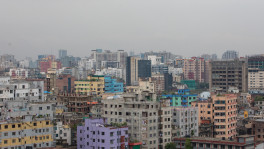The ethos of Mujibnagar

The message in Bangladesh on every observance of Mujibnagar Day must be simple but comprehensive in its theme. It is that on 17 April 1971, for the first time in history, a government formed by a Bengali political leadership took upon itself the onerous task of organizing resistance to the Pakistan occupation army through shaping a clear battlefield strategy. On that day, history took a new turn for the people of Bangladesh, for it was men like Tajuddin Ahmad, Syed Nazrul Islam, AHM Quamruzzaman and M. Mansoor Ali who went ahead in providing leadership to a nation prepared to make sacrifices at the call of Bangabandhu Sheikh Mujibur Rahman, Bangladesh's founding father.
Today, forty nine years after the Mujibnagar leadership informed the world that the Bengali nation had declared itself free, that it had a government formed by its elected representatives, that this government would wage war in defence of national liberty, how much do we remember of that seminal moment in our history? Of course, there will be all the platitudes and all the clichés today on the anniversary of the formation of the government-in-exile. But platitudes and clichés do not serve the purpose of history. And history is surely a vast canvas which must record the contributions of every single individual who has had a role in its making. To what degree do the young in Bangladesh know the background to the Mujibnagar government and the decisive role it played in the darkest of times for this nation?
This morning, it is the details of history that matter. Tajuddin Ahmad matters, for his was a cerebral imagination which knew only too well that beyond the Pakistani repression, beyond the fears and the doubts, there was the paramount need for organized resistance to the enemy. An intellectual to the core, Tajuddin was one man who, in association with Bangabandhu, took the movement for autonomy and all that flowed from it forward. Let the truth not be sidelined, which is that had Tajuddin Ahmad not been around in April 1971, the history of this country would have meandered off in a different direction…and not necessarily a happy one.
How much does our younger generation know of the greatness and the sagacity which defined the Tajuddin persona? For the illustrious man that he was and always will be, not much of official literature is available on him. It is sad and painful that efforts to preserve Tajuddin Ahmad's place in Bangladesh's history have largely been those made by his children, through their books on his life and career. That is not enough, for the State too must fulfill its responsibility in upholding the reputation of a political leader whose dedication to the national cause at all times, indeed to the emergence of the State itself, was beyond question.
History must necessarily be comprehensive. And because it must, the nation must be made acquainted with the political commitment which defined the lives of the other great men involved in the Mujibnagar reality. The contributions of Syed Nazrul Islam to the making of this free country have over the years been obscured. The defining role played by AHM Quamruzzaman in the story of national liberation – he was a member of the Pakistan national assembly in the 1960s and in that position was an authentic Bengali voice in the pre-1971 era – remains unknown to the young, to researchers. And the rich political career, accompanied by sustained devotion to the national cause, of M. Mansoor Ali is as good as forgotten today. The patriotism of MAG Osmany is fast becoming a receding memory. No comprehensive literature, no purposeful biographies of these great men are around. That should not have been our story.
A meaningful message must go out to the country today: as we recall Mujibnagar, we must plumb the depths of the personal and political histories of the four men – Tajuddin Ahmad, Syed Nazrul Islam, AHM Quamruzzaman, M Mansoor Ali – who told the world, in no uncertain terms in April 1971, that Bangladesh had arrived, that armed resistance to the oppressors was on. History cannot be selective, which is why it becomes important for us to remind ourselves that Mujibnagar was a cause that along the way to liberation sometimes stumbled, as any great revolution stumbles, on difficulties arising out of the motivated politics of others in the movement. Any retelling of the Mujibnagar story must record the many ways and means by which the Young Turks in the liberation movement sought to put up impediments before Tajuddin Ahmad through bringing a motion of no confidence against him. The state must not fail to inform the young and the researchers and everyone else of the sinister politics the likes of Khondokar Moshtaq Ahmed tried bringing into play even as the War of Liberation went on.
The Mujibnagar government remains emblematic of national pride. None of the men who formed its nucleus could claim any earlier experience of government and yet they went about shaping and operating a government that lived up to popular expectations. This government put an administrative structure in place, reconfigured an occupied country into eleven war sectors, formed the Mukti Bahini and presided over the making and implementation of a guerrilla struggle against a brutal organized army. It did more. It gave shape to Shwadhin Bangla Betar, the radio outlet which provoked and encouraged armed resistance to the enemy all across the country. It defined the fundamentals of wartime diplomacy through having Bengali diplomats turn their backs on Pakistan and propagate and promote the national cause abroad.
The full history of Mujibnagar is yet to be written, in that broad sense of the meaning. It is the story of men like Amir-Ul Islam, the young lawyer whose contribution to the drafting of the Proclamation of Independence remains one of our great reasons for pride. It speaks of Professor Yusuf Ali, whose reading out of the Proclamation galvanized a nation. It is the tale of the peasants and the workers and the students and the government employees and the artistes who responded, in sheer energy and martial spirit, to the call to arms by the government.
This morning, let us be specific on this Mujibnagar question. Studies of history at schools, colleges, madrasas and universities in the country will be without focus, will be incomplete and therefore will be without meaning if the history of the Mujibnagar government is treated in selective manner or is passed over through brief references that are really footnotes.
Our history as a people certainly did not begin with the Mujibnagar government. The bigger reality, though, is that Mujibnagar made history on a grand scale. We the people were present at its creation, which is why we are not willing to see it pass into the mists of time.
Syed Badrul Ahsan is a journalist and political biographer. His works include biographies of Bangabandhu Sheikh Mujibur Rahman and Tajuddin Ahmad


 Keep updated, follow The Business Standard's Google news channel
Keep updated, follow The Business Standard's Google news channel
















